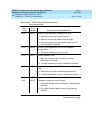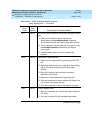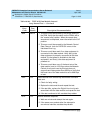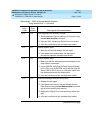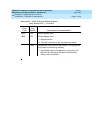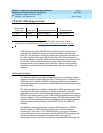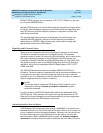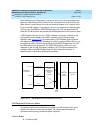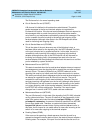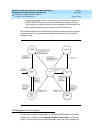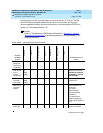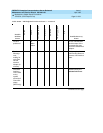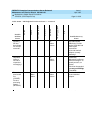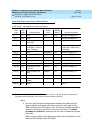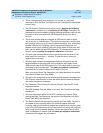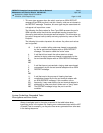
DEFINITY Enterprise Communications Server Release 5
Maintenance and Test for R5vs/si
555-230-123
Issue 1
April 1997
Maintenance Object Repair Procedures
Page 10-1028PE-BCHL (PRI Endpoint Port)
10
The B-channel is in its normal operating state.
■ Out-of-Service/Far-end (OOS/FE)
A B-channel is initialized to this state when administered. The switch
sends messages to the far-end terminal adapter to negotiate the
B-channel into service. If the far-end terminal adapter does not respond to
the messages within a certain time period, the service state remains
out-of-service, and maintenance periodically resends the messages. The
port is unusable for calls incoming to the switch and outgoing to the
terminal adapter (although other ports in the PRI Endpoint can still be
used for incoming and outgoing calls).
■ Out-of-Service/Near-end (OOS/NE)
This is the state of the port whenever one of the following is true: a
hardware failure exists on the signaling link, the NPE Crosstalk Test fails,
or the port is busied out by system technician. In this state, the port is
unusable for calls incoming to the switch or outgoing to the terminal
adapter (although other ports in the PRI Endpoint can still be used for
incoming and outgoing calls). No messages are sent to the far-end
terminal adapter until the signaling link comes back into service or until the
port is released by system technician.
■ Maintenance/Far-end (MTC/FE)
This state is reached when the far-end terminal adapter does not respond
to messages sent over the signaling link for a particular port after a certain
amount of time. This state is different from OOS/FE inasmuch as the
signaling link must be up initially and the B-channels must be in-service.
The switch periodically sends messages to the far-end terminal adapter in
an attempt to negotiate the port (B-channel) into service. The port is
unusable for calls outgoing to the terminal adapter. However, the port
services incoming call requests from the far-end (although other ports of
the PRI Endpoint can still be used to answer calls incoming to the switch
or to place outgoing calls to the terminal adapter). Note that transitions
into MTC/FE do not drop stable calls. Therefore, if the service state
changes from in-service to MTC/FE, stable calls are unaffected.
■ Maintenance/Near-end (MTC/NE)
The port (B-channel) is in this state if the signaling link (PI-LINK) is busied
out by system technician. The port (B-channel) is also temporarily in this
state if the system technician has issued a test port PCSSpp l or a test
pri-endpoint <extension> l command. Note that transitions into MTC/NE
do not drop stable calls. Therefore, a system technician-demanded
busyout link lnk-no command does not drop stable wideband calls. In
this state, the B-channel is not usable either for new calls incoming to the
switch or for new calls outgoing to the terminal adapter.
■ Pending States (PEND)
If the near-end is expecting a timed response from the far-end for a
request to change the service state of a port, the state of the port reflects a
Pending state. For example, if the port is out-of-service/far-end and if an



